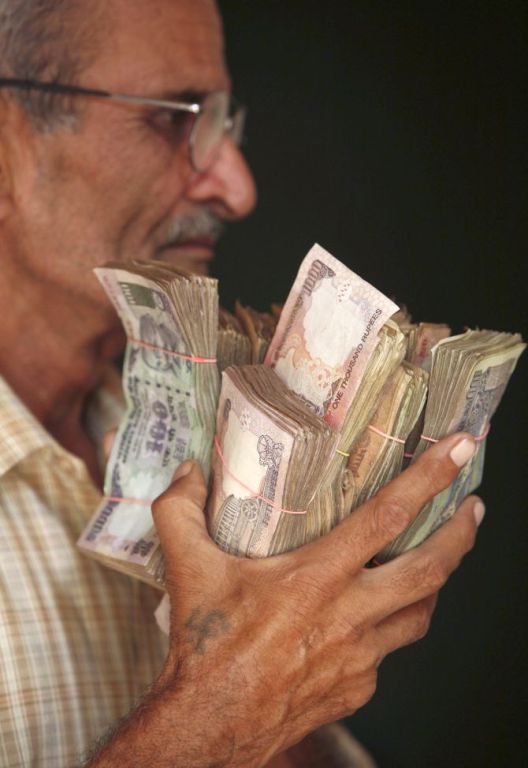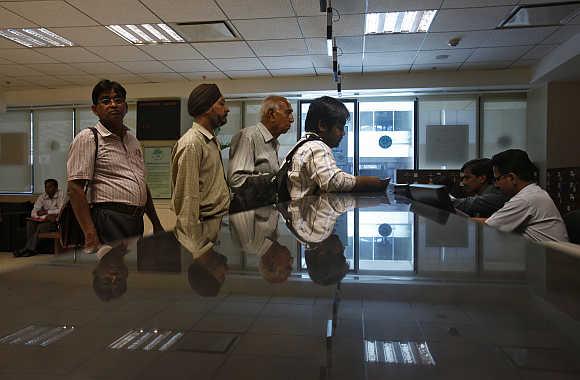 | « Back to article | Print this article |
Little tax relief on the cards this Budget
When Finance Minister Arun Jaitley turns to part-B of his Budget speech on July 10, the common man may be left disappointed.
Taxpayers expecting the income tax exemption limit will be raised to Rs 500,000 or the deduction limit to Rs 200,000 might have to settle for a marginal adjustment in the slabs.
While reports have said ahead of Assembly elections in a few states, the government wants to give some tax relief to individuals, the disposable incomes of whom have been depleted by the high inflation, the trade-off between this and keeping the government’s fiscal deficit low will be difficult.
Even if the tax exemption limit is increased to Rs 300,000, the loss to the exchequer will be Rs 30,000 crore (Rs 300 billion).
Please click NEXT to read further. . .
Please click here for the Complete Coverage of Budget 2014 -15
Little tax relief on the cards this Budget
Similarly, if the deduction limit under section 80C of the Income Tax Act is doubled to Rs 200,000, there will be an additional loss of about Rs 30,000 crore (Rs 300 billion).
Tax experts say the government might not increase both the limits substantially, though a total increase of at least Rs 1 lakh crore (Rs 1 trillion) is needed, as persistently high inflation had eroded household savings.
“The government should give some benefit to people; there might be other ways to offset the revenue loss by cutting subsidies, higher disinvestment or improving compliance.
“If it is raised to Rs 300,000, it is a nominal increase,” said Divya Baweja, senior director, Deloitte.
Please click NEXT to read further. . .
Please click here for the Complete Coverage of Budget 2014 -15
Little tax relief on the cards this Budget
Vikas Vasal, partner, KPMG, said either the exemption limit or deduction limit should be raised.
He added the latter would serve the dual purposes of providing relief to taxpayers and giving a push to the infrastructure sector.
Currently, the government allows tax-free investment up to Rs 20,000 in infra bonds.
Besides infrastructure, the government might consider increasing the limit for health insurance.
Currently, deduction is allowed for health insurance premium up to Rs 15,000 for self, and an equal amount for dependent parents.
Please click NEXT to read further. . .
Please click here for the Complete Coverage of Budget 2014 -15
Little tax relief on the cards this Budget
While the government will aim to give tax relief to the inflationstruck small taxpayer, an across-the-board increase in the exemption limit will benefit all taxpayers.
As such, the finance ministry could replicate a step taken in last year’s Budget, when the government had proposed to provide a tax credit of Rs 2,000 to every person with a total income of up to Rs 500,000, benefiting 18 million taxpayers.
The exchequer, however, took a hit of about Rs 3,600 crore (Rs 36 billion).
If tax slabs are adjusted according to the recommendations of a standing committee -- Rs 300,00010 lakh or Rs 1 million (10 per cent tax), Rs 10-20 lakh or Rs 1-2 million (20 per cent), and Rs 20 lakh or Rs 2 million or more (30 per cent) --, the government will take a hit of Rs 60,000 crore (Rs 600 billion).
Please click NEXT to read further. . .
Please click here for the Complete Coverage of Budget 2014 -15
Little tax relief on the cards this Budget
This recommendation was turned down by the finance ministry under the previous regime.
A concern is the move will further erode the already-low (about 33 million) tax base. If the slab is raised to Rs 300,000, 87 per cent taxpayers will escape the tax net, against the current 72 per cent (with annual income of up to Rs 200,000).
“Given the high inflation, the tax exemption limit should go up by Rs 100,000.
“I recognise the fact that a huge number of taxpayers will go out of tax net, but they don’t contribute much to the total tax collections,” said Amarpal Chadha, partner, EY.
Please click NEXT to read further. . .
Please click here for the Complete Coverage of Budget 2014 -15
Little tax relief on the cards this Budget
The tax collected from the Rs 200,00010 lakh (Rs 1 million) income bracket is about Rs 21,094 crore or Rs 210.94 billion (from about 27 million taxpayers), while that collected from about 335,000 taxpayers in the Rs 1020 lakh (Rs 1-2 million) income group is Rs 10,185 crore (Rs 101.85 billion).
About 185,000 taxpayers in the income group of more than Rs 20 lakh (Rs 2 million) contribute Rs 53,170 crore (Rs 531.7 billlion).
What worries the finance ministry more than a section of taxpayers going out of the tax net is the fact that it won’t get a lot of information that comes with returns.
Please click NEXT to read further. . .
Please click here for the Complete Coverage of Budget 2014 -15
Little tax relief on the cards this Budget
And, if the ministry makes it mandatory for everyone to file returns, there won’t be a fall in administrative costs.
To cut the government’s administration costs and focus on higher income-group taxpayers, a parliamentary standing committee headed by Bharatiya Janata Party leader Yashwant Sinha had suggested four slabs.
It had also proposed the deduction limit for investment in long-term savings be increased from Rs 100,000 to Rs 150,000, while the deduction limit towards life insurance premium, health insurance premium and tuition fee be increased to Rs 100,000.
Currently, deduction is allowed for health insurance premium up to Rs 15,000 for self and Rs 20,000 for dependent parents.
Please click here for the Complete Coverage of Budget 2014 -15






